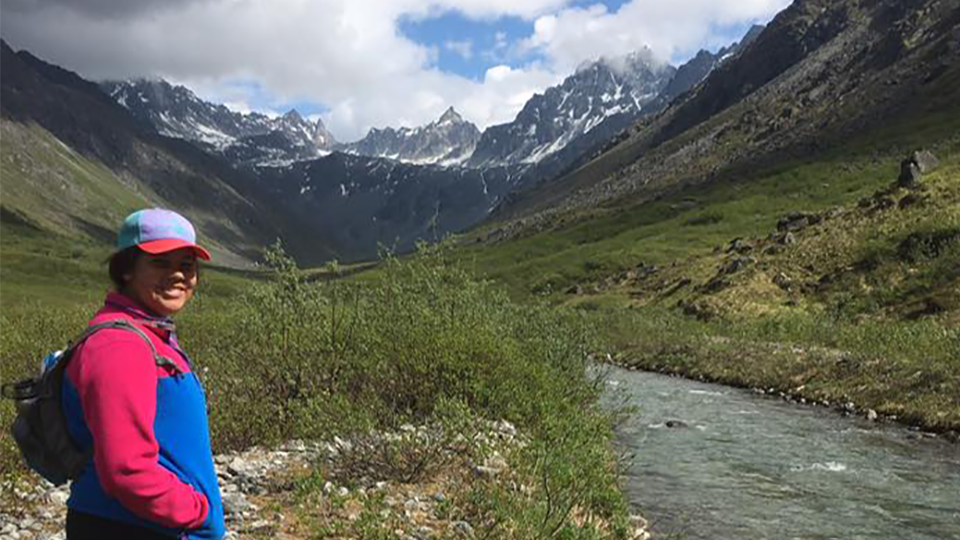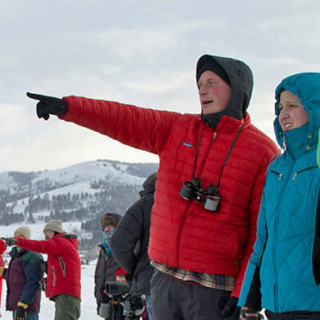Student Spotlight: Brianna Ashley

In this episode, Brianna Ashley talks about her work as a master’s student in environmental studies at UM. Brianna is passionate about land stewardship, and wants to see greater BIPOC participation in outdoor recreation. She discusses the breadth of experiences she’s had in the EVST program, valuing the way her role as educator also positions her to learn from the communities she serves.
Story Transcript
I grew up in Palmer, Alaska. South central Alaska. Really was outdoorsy, adventurous into land stewardship from a young age, you know, hanging out with my parents and my elders and stuff like that. I’m also Native. I'm Cherokee out of North Carolina. So, a lot of those values really were instilled in me from childhood. But, you know, kind of have an idea of, you know, the land you're on and kind of your relationship with it because it's a dichotomous relationship, you know. It's not just, you give and take. You know, I carried that with me since I was little, and I'll continue doing it to whatever land I'm on in the future.
My name is Brianna Ashley. I'm a -- just finished my first years of getting my master's in environmental studies with a focus in Indigenous knowledge and environmental education.
With me being, you know, a BIPOC woman, I was really shunned from working in the outdoor industry because it just really wasn't meant for me using quotations, you know. I was supposed to work in the office job. And so, I just was super resilient toward that. And so, even from when I was 13, 14, I've always been working outside using my hands and just kind of building that community and making that space for, not just women, but just like BIPOC people in general just, you know, this space is for everyone not just for the super-cis, het, white males, you know, we’re out here making changes in our communities. And yeah, throughout primary school, secondary school, even in my undergrad, I kind of focused on environmentalism and just kind of, spreading that knowledge to usually the younger audience -- high schoolers, middle schoolers. So, now that I'm in my, you know, graduate school, I'm kind of putting those, my curated skill set to work and really getting out into my community and working with Missoula youth.
I'm actually doing a portfolio which is basically three theses together. So, it's going to be a big chunk to chew off of. So, I’ll be doing, I'm moving to New Mexico this summer to work with Indigenous youth leading expeditions, doing archeology, kind of working with the Navajo and the Zuni Nations down there. I'll just be kind of cowboy camping in my sleeping bag, just hiking, you know, about two to three hundred miles per 16 days, just kind of going through the reservations, and I'm doing paleontology. So, I'm going to be talking about the fossils and the animals that were there before, and also doing a little bit of, like, plant ID, botany, stewardship practices. And the youth I'll be working with primarily is 15-to-18-year-olds. So, high schoolers who are ready to go to college. So, I'll have a group of maybe ten to 12 students who will be walking with me the entire summer. So, we'll be putting on, you know, a couple thousand miles I'm assuming just walking through Colorado, Utah, Arizona, New Mexico. And, you know, we'll be doing a lot of ceremonies, a lot of prayer, a lot of practices, kind of getting them more familiar and connected to their landscape. I really want to, you know, kind of plant this seed of curiosity with environmentalism and stewardship early, you know, I had that, you know, wonderful elders in my life who have done that for me. And I just, I, I feel obligated to pass that on.
I'm also going to be working with outdoor recreation and the BIPOC community here in Missoula. I've only been here for a couple of months, but I just know there's a pretty low diversity turnout when it comes to cross country skiing or hiking the M or, you know, going up to Lubrecht, or anything like that. And I kind of wanting to investigate why since Montana is such a hub for outdoor recreation. I'm new here, so I kind of wanted to dive head first. So, working with more participants is going to be another component of my thesis work. So, I started doing interviews with the participants I want to know what their perspectives are and seeing what our community can do to better diversify the outdoor recreation here. And I think the last part is going to be like, a creative writing piece more of a, you know, a creative non-fiction type of work of going through the journey of education, Western education and Indigenous education throughout my life, so. I think it's just going to be my own personal story, my own personal growth with environmentalism and Indigenous knowledge. And how kind of I'm switching the roles from educator to student and kind of putting the educator roles into the student's hands and me being an instructor, I’m the one who's really learning and taking the most from this experience.
I think Neva Hassanein she really talked about being a generalist and that's really what an environmentalist is. Like, you have just so many interests and you can really curate your own path to make it your own. And when she said that I was like, it really did just click for me cause, you know, you’re not, you don’t have to be in this little tight box of ecologist or like a hydrologist or anything. You can really take environmental ed and environmental justice and farming and whatever else you want. And just like curate your own kind of schedule and game plan and then come out with this like really tangible, you know, successful product at the end. I'm so happy I came. This is everything I wanted plus more.
